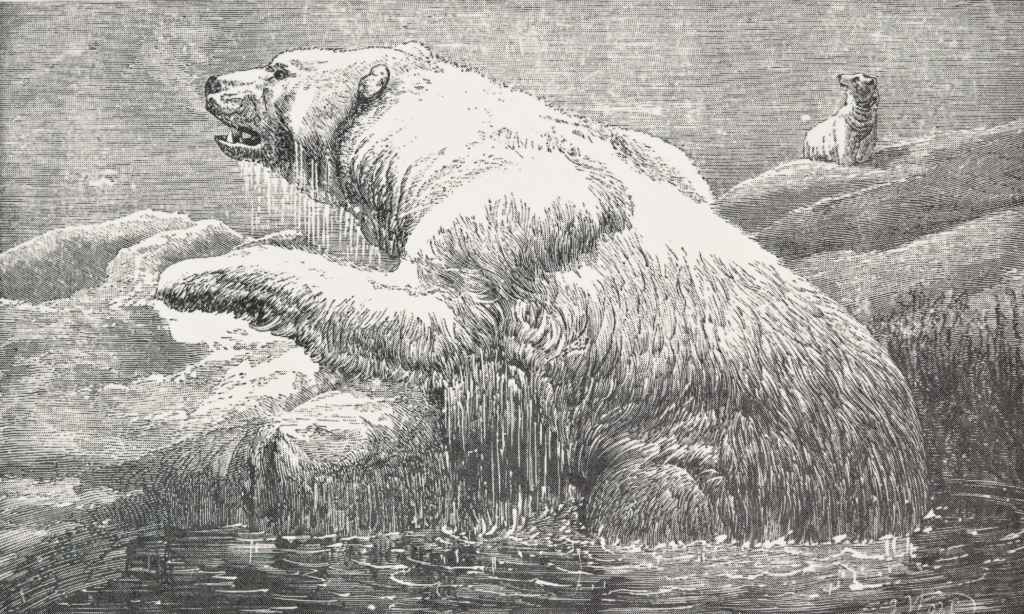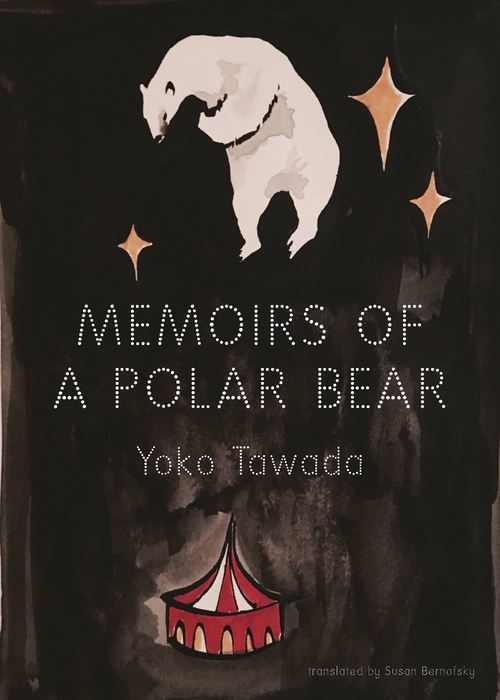
Reviewed by Campbell Campbell
I spent the last year reading working class writing and pondering the perils of living under capitalism. I read Memoirs of a Polar Bear not knowing I needed its perspective.
Our story begins in the early twentieth century with a polar bear who works day and night in the circus until she injures herself learning an arduous Latin American dance routine to increase ticket sales. She considers herself deepy fortunate to have found an administrative job in the circus rather than to have been shot for her lack of profitability. She begins to attend “paralyzing boring conferences” where she voices measures to make the companies eco-friendly but is met with empty stares by the corporate-minded Homo sapiens. She feels suffocated by their death drive and spends the hours trying to remember the details of her childhood–where was she born, how did she come to the circus, and what circus act forced her to become bipedal? She is essentially asking herself what parts of her have evolved for the sake of living in a society and have these adaptations been at all to her benefit.
Filled with desire while writing, she knows that she must leave the corporate world and attempt to make a life for herself as a writer. “It was the first time ever that I’d turned down a conference invitation. I was afraid of being annihilated on account of saying no: those who refuse to fulfill their duties lose their right to exist. But my desire to go on writing my autobiography was by that point already three times the size of my fear of having my existence destroyed.” However, Memoirs of a Polar Bear is not the reformed courtship plot with the suitor at the end of the novel being a shiny book deal from a publisher. Writing is filled with peril and anxiety when she receives orders from her publishers that she must omit political messages and write in her native tongue. What began as an absurd tale about a polar bear trying to succeed in the adult world becomes a chilling narrative about the expectations placed on marginalized writers.

Yoko Tawada is a rare writer to have mastered writing novels in both Japanese and German and to have cultivated an uncanny writing style that echoes Kafka, Murakami, and Pynchon. She has become an international sensation, and hopefully soon a household name, for The Bridegroom Was a Dog which won the Akutagawa Prize and The Emissary which won the National Book Award in Translated Literature. In Memoirs of a Polar Bear, she blurs the line between animal and human and defamiliarizes working conditions to have her reader question if this is the society we want to build together. She returns to the political subjects from her other books—the economic history of East Berlin in the twentieth century and linguistic hegemony. But she does so in this novel with so much strangeness, humor, and uncanny voicing that you have to keep flipping the page not to see what she will do, but what she can do by her vast imagination.
How is this political thought and experimental syntax complemented by the translator Susan Bernofsky? Bernofsky’s oeuvre attests to her interest in political subject matter with her translations of Go, Went, Gone that investigates the European refugee crisis and Visitation that explores the economic conditions of East Berlin after World War II. Similarly, her personal writing attests to her love for the unfamiliar in syntax and reshaping what we think that English can do. Rather than ask the age-old but unproductive question of how the original was lost in the translation process, it may be fair to ask how the original benefitted from the mind of a political thinker and creative writer like Bernofsky. What would it be like to read this text without sprinkles of her genius throughout?
We can see such political thinking and historical research throughout the novel. Our main polar bear even inserts herself in the workers’ movement that emerged in the newly industrialized Germany in the 1860’s and continued past the November Revolution of 1918. Tawada offers a comparison between the polar bear’s writing under the publisher’s demands to the automated labor that plagued the industrial period–and that perhaps plagues our digitalization period. I could stop reading the novel at that comparison and think to myself that she has gone too far in equating creative work with the repetition of factory work. This is a claim that is often shared among the contemporary creative class, and should be met with skepticism when one considers the involvement of the creative class as part of the downfall of the Communist Party. But I would rather continue reading what else Tawada has to say and charitably place Tawada’s novel in the current publishing landscape that tokenizes marginalized writers and that is threatened by the creation of GPT-3 writing algorithms. Memoirs of a Polar Bear is a call for readers to be better, give writers more freedom, and rise above algorithmic thinking that only supports the current conditions of society.
The novel will make you laugh with its polar bear narration, especially when the polar bear spends her paycheck on salmon and plans a separatist colony for polar bears in Canada. But it will likewise surprise you with its ability to subvert the expectations that the publishers outline for the polar bear’s writing: it is willing to rant about the workers’ need for unionization, to criticize the notion that society is evolving for the better, and to mourn those who died from poverty in East Berlin in the early twentieth century. Delightful, biting, smart, and worthy of its wide readership, Memoirs of a Polar Bear is essential reading for those interested in economic history, workers’ rights, and yes, polar bears.